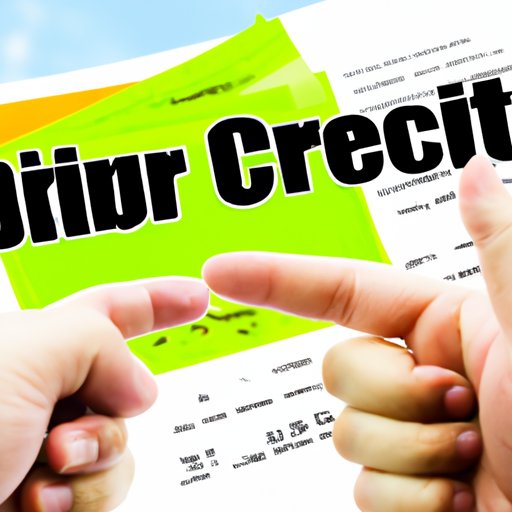Introduction
Your credit score is an important number that affects many aspects of your life, from getting approved for a loan or rental application to being able to get a lower interest rate on a loan. Understanding what makes up your credit score and how to improve it is essential for managing your finances. This article will provide a comprehensive guide on how to raise your credit score in 30 days.

Overview of Credit Score and How It Is Calculated
Your credit score is a three-digit number that reflects your creditworthiness. It is based on information from your credit report, which is a record of your borrowing and repayment history. The most commonly used credit score is the FICO Score, which ranges from 300 to 850. The higher your score, the better your credit health is considered to be.
FICO Scores are calculated based on five main factors: payment history (35%), total amount owed (30%), length of credit history (15%), new credit (10%), and types of credit used (10%). Payment history is the most important factor, so ensuring that you make all payments on time is the first step to improving your credit score.
Pay Off Existing Debt
Paying off existing debt is one of the quickest ways to improve your credit score. Your payment history accounts for 35% of your FICO score, so it’s important to make sure that you pay any outstanding debts as soon as possible.
When trying to pay off existing debt, it’s important to prioritize. Start by paying off the debts with the highest interest rates first, as these will cost you more money in the long run. You can also use the snowball method, which involves paying off the smallest debts first and then working your way up to the larger ones. This will help you stay motivated as you see your progress.

Dispute Any Errors on Your Credit Report
Errors on your credit report can have a negative impact on your credit score. It’s important to check your credit report regularly and dispute any errors that you find. You can request a free copy of your credit report from the three major credit bureaus – Equifax, Experian, and TransUnion – once every 12 months.
Once you have the report, review it carefully for any mistakes or inaccuracies. If you find any errors, contact the credit bureau directly to dispute them. They should investigate the issue and remove any incorrect information from your report.
Make All Payments on Time
Making all payments on time is essential for keeping your credit score high. Late payments can have a significant negative impact on your credit score, so it’s important to make sure that you make all payments on time.
One way to ensure that you make all payments on time is to set up payment reminders. You can set up reminders on your phone or computer to remind you when payments are due. You can also set up automatic payments to make sure that you never miss a payment.

Lower Your Credit Utilization Ratio
Your credit utilization ratio is the amount of credit you’re using compared to the amount of credit available to you. For example, if you have a credit card with a $1,000 limit and you’ve charged $500, your credit utilization ratio is 50%. Keeping your credit utilization ratio low is important for improving your credit score.
To lower your credit utilization ratio, you can either pay down your existing balances or ask for a credit limit increase. Paying down your balances will reduce the amount of credit you’re using, while a credit limit increase will give you more credit available, thus reducing your credit utilization ratio.
Ask for a Credit Limit Increase
Asking for a credit limit increase is another way to improve your credit score. A higher credit limit means that you’ll have more available credit, which will lower your credit utilization ratio. This can have a positive effect on your credit score.
When asking for a credit limit increase, make sure to explain why you need it. This could be to cover an emergency expense, consolidate debt, or just to improve your credit score. Be sure to mention that you have a good payment history and that you’re responsible with your credit.
Conclusion
Improving your credit score in 30 days is possible if you take the right steps. Start by paying off existing debt, disputing any errors on your credit report, making all payments on time, lowering your credit utilization ratio, and asking for a credit limit increase. Taking these steps will help you improve your credit score and build a strong financial future.
(Note: Is this article not meeting your expectations? Do you have knowledge or insights to share? Unlock new opportunities and expand your reach by joining our authors team. Click Registration to join us and share your expertise with our readers.)
